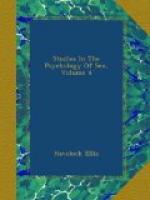woman smell the flowers she likes best, he remarks,
and she will close her eyes, breathe deeply, and,
if very sensitive, tremble all over, presenting an
intimate picture which otherwise she never shows, except
perhaps to her lover. He mentions a lady who
said: “I sometimes feel such pleasure in
smelling flowers that I seem to be committing a sin."[74]
It is really the case that in many persons—usually,
if not exclusively, women—the odor of flowers
produces not only a highly pleasurable, but a distinctly
and specifically sexual, effect. I have met with
numerous cases in which this effect was well marked.
It is usually white flowers with heavy, penetrating
odors which exert this influence. Thus, one lady
(who is similarly affected by various perfumes, forget-me-nots,
ylang-ylang, etc.) finds that a number of flowers
produce on her a definite sexual effect, with moistening
of the pudenda. This effect is especially produced
by white flowers like the gardenia, tuberose, etc.
Another lady, who lives in India, has a similar experience
with flowers. She writes: A scent to cause
me sexual excitement must be somewhat heavy and penetrating.
Nearly all white flowers so affect me and many Indian
flowers with heavy, almost pungent scents. (All the
flower scents are quite unconnected with me with any
individual.) Tuberose, lilies of the valley, and frangipani
flowers have an almost intoxicating effect on me.
Violets, roses, mignonette, and many others, though
very delicious, give me no sexual feeling at all.
For this reason the line, ’The lilies and languors
of virtue for the roses and raptures of vice’
seems all wrong to me. The lily seems to me a
very sensual flower, while the rose and its scent seem
very good and countrified and virtuous. Shelley’s
description of the lily of the valley, ‘whom
youth makes so fair and passion so pale,’
falls in much more with my ideas. “I can
quite understand,” she adds, “that leather,
especially of books, might have an exciting effect,
as the smell has this penetrating quality,
but I do not think it produces any special feeling
in me.” This more sensuous character of
white flowers is fairly obvious to many persons who
do not experience from them any specifically sexual
effects. To some people lilies have an odor which
they describe as sexual, although these persons may
be quite unaware that Hindu authors long since described
the vulvar secretion of the Padmini, or perfect
woman, during coitus, as “perfumed like the lily
that has newly burst."[75] It is noteworthy that it
was more especially the white flowers—lily,
tuberose, etc.—which were long ago
noted by Cloquet as liable to cause various unpleasant
nervous effects, cardiac oppression and syncope.[76]




